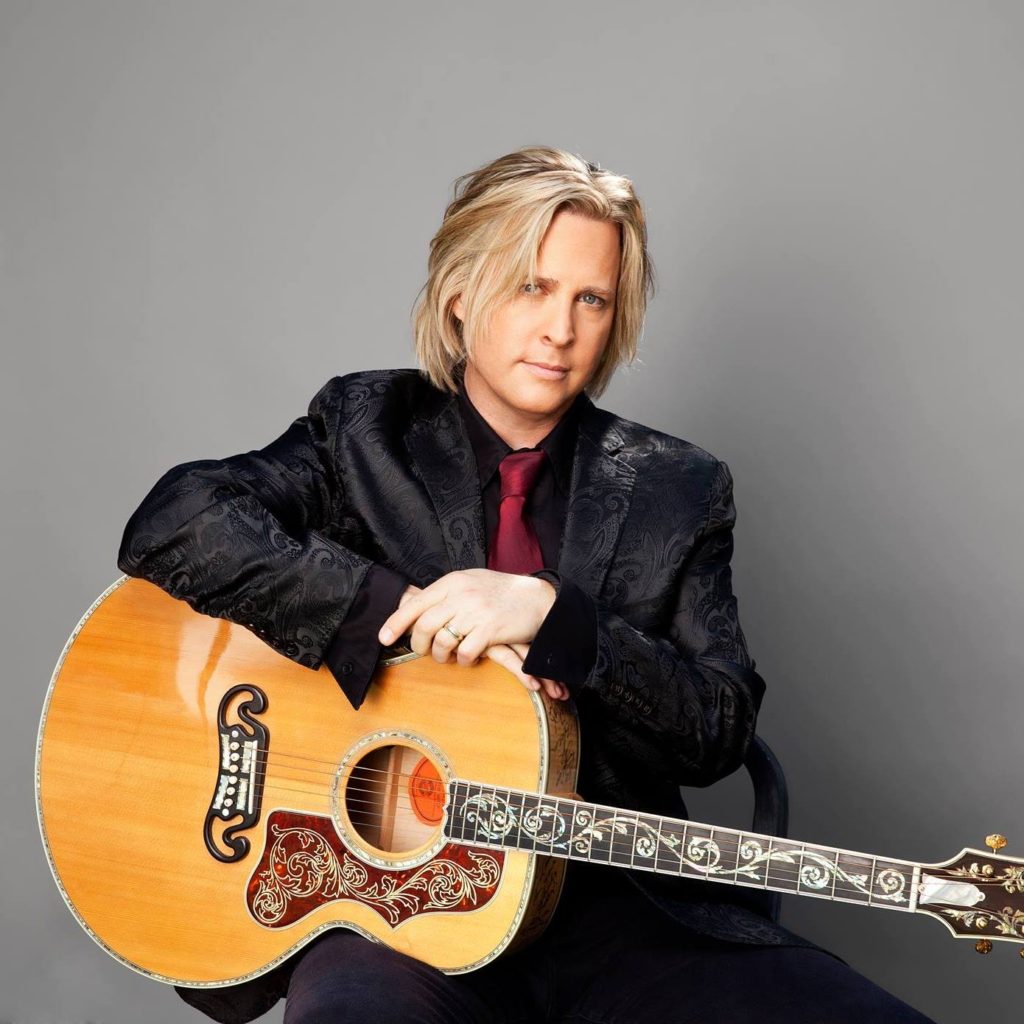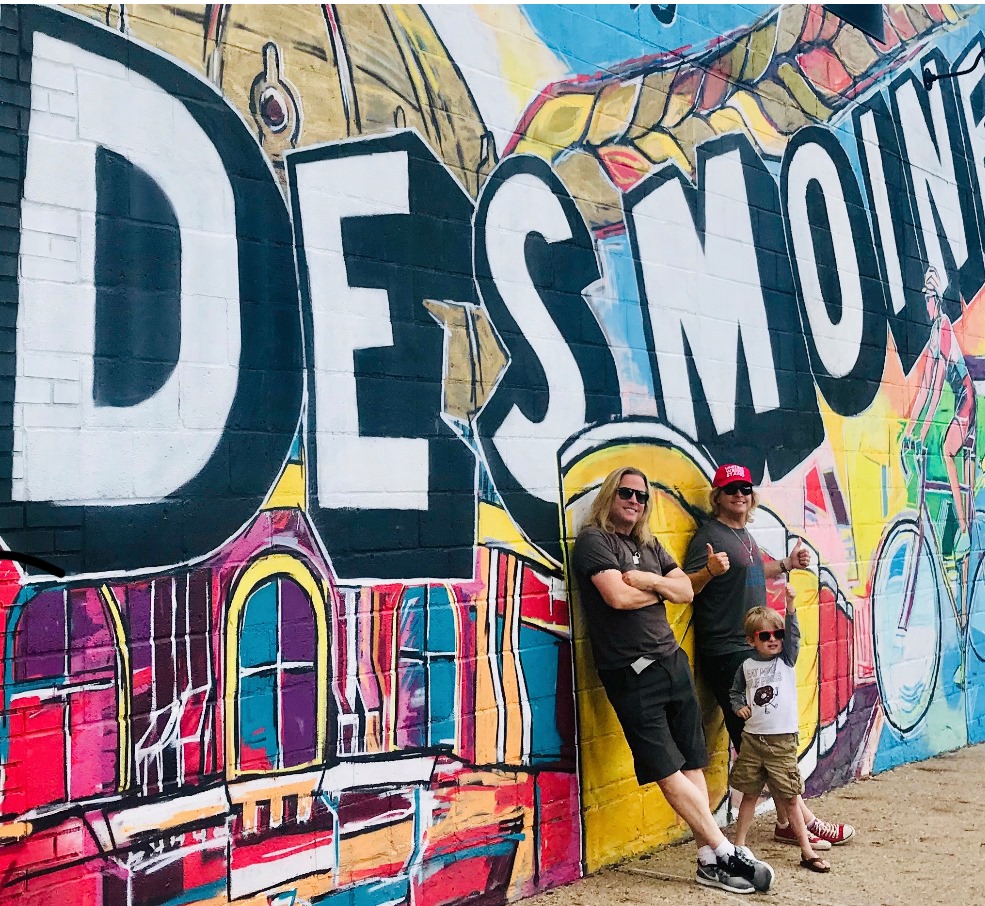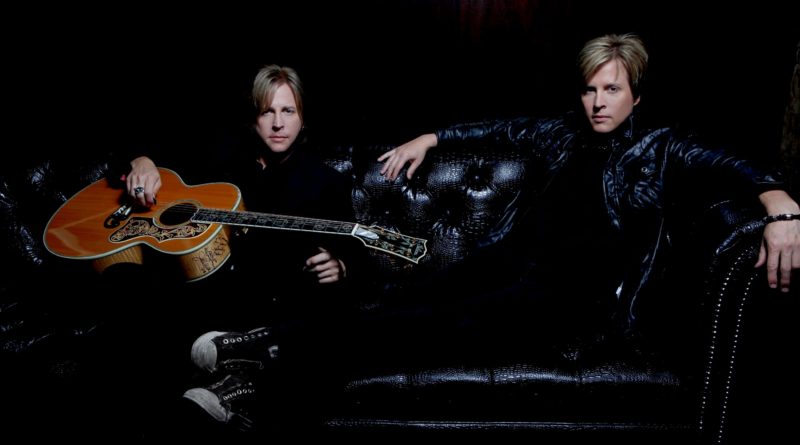After The Rain: A Conversation with Matthew Nelson
Of all the national artists who have played the Iowa State Fair stages the past 10 days, hands down, Matthew Nelson is the “most Iowa.”
Nelson, of course, is one half of the famous Nelson brothers tandem (along with twin, Gunnar) who hit No. 1 on the Billboard charts in 1990 with “(Can’t Live Without Your) Love and Affection.” Or you may know him as the son of multi-million selling pop star Ricky Nelson, with equally-as-famous grandparents by the name of Ozzie and Harriet Nelson.
Yes, THOSE Nelsons.
But here in the Tall Corn State, Matthew Nelson is, by all accounts, just one of us. With family in Decorah, Nelson spends a good chunk of time in Iowa each year, soaking up the heartland hospitality and imbibing in our one-of-a-kind food offerings.
“I normally hang in the Decorah area for about a month every year,” Nelson said in a recent phone interview with ListenIowa. “There’s a place that I yearn for there called the Whippy Dip; it’s kind of like a Tastee-Freez, and is a Decorah staple. It’s definitely worth the 10-hour drive to go to before they close for the season. It is so good.”
And that’s not all he likes about the state. Two corporate Iowa staples — Kum & Go and Casey’s — are great, he said, but it’s something on the latter’s menu that really gets his taste buds singing.
“I love the Casey’s breakfast pizza,” he said. “That’s my jam. That and taco pizza. They don’t do taco pizza anywhere except Iowa.”
Nelson has been in Central Iowa for a few weeks now, visiting, eating, and equally as important, preparing for a Nelson brothers return to the stage tonight, Aug. 18, where they close out the fair on the MidAmerican Energy Stage at 8 p.m.
ListenIowa caught up with Nelson recently for a look back at he and his brother’s whirlwind ride to the top (and equally as fast descent); what they’ve been doing since; and a run-in with the notoriously anti-mainstream, Mr. Henry Rollins, among other things.
What does Nelson look like in 2019 for those who haven’t been paying attention?
Our drummer and guitar player grew up in Waukon (Iowa) where they have a band there called The Caminos. Half the lineup is Iowa-based, actually. In our shows, we always address the biggest hits in our shows, maybe give a tip of the hat to our dad, and also let the band stretch out with one or two covers. We want to leave the audience surprised. We’ve been doing some country music for a long time as well, so we may do some from that flavor, too.
You’ve been playing overseas for years now. Do you notice a difference in the reaction to Nelson over there as opposed to the States?
Yes, definitely. In the States, Gunnar and I had a No. 1 hit on the Billboard pop chart back in the day when it was Paula Abdul, M.C. Hammer and Mariah Carey. We were the one band that didn’t have to do ballads to hit No. 1. But we were kind of like men without a country. Here in the States, people were wearing black leather and trying to be Guns N’ Roses. That wasn’t us. In England, they got it. My wife saw a video of us playing over there and said, “Matt. There are no girls; it’s all dudes wearing Nelson shirts.” It was bizarre and the exact opposite of the States, where it was primarily a female-driven audience. It literally was the opposite. It’s crazy.
You had the huge success with your debut album, “After The Rain,” which sold millions of records. But grunge hit, things changed, and Nelson seemingly disappeared. But you really didn’t. You’ve got 14 albums under your belt since then. Does that surprise people?
Yeah, we’ve been averaging an album every two years. They’re different categories. Our Christmas album, I’m very proud of. We wrote a Christmas single that broke the Top 10 on the Billboard chart two years in a row, which is tough to do, especially on an indie label. You’re going up against Bing Crosby and Mariah Carey. We have a country project called First Born Sons, which we’re going to be releasing this year. We’re calling it something different, because we don’t want people to listen to it and think of spandex and blonde hair. I think people are surprised, yes. But for us, music wasn’t a hobby; it never has been. We started playing when we were 7, and were playing clubs when we were 12. Our father passed away, and then we completely retooled it. Gunnar came up off the drums and up front on guitar. We started writing and got that package together at just the right time. MTV was the right vehicle for it, and frankly, we carved out a niche that wasn’t there. It blew up. This was before the Internet, though. I don’t want to sound like the old guy, but music doesn’t matter like it did 30 years ago.
Not even close.
No, not even close. I hate to say it, but it’s become background music. Kids are into shooter games. We grew up pumped for that next album by whoever to come out. We couldn’t wait for that next record to hit the street, and we got to go down and buy the cassingle. (laughs)
Your time in the spotlight was short, but for that brief period, Nelson was “it.”
Yeah, we’ve been to the highest of highs and the lowest of lows, and all over the world, but it comes down to my brother and I having something that is unique and special; it has nothing to do with our Pop selling half a billion singles. We don’t just sing brother harmonies, we sing twin harmonies. It’s a very unique sound. We worked on it so that if someone is flashing through the dial, he or she could pick out Nelson in five seconds. To me, that was our goal, to write the best songs and have a song that is identifiable. The irony of it is, back then, the Bon Jovi-type bands, none of them would let us in their little club. We were too pop.
And you had to fight the rise of grunge as well.
That shift to grunge wasn’t organic, let me tell you. It was a calculated business move by the powers that be at the time. Overnight, it became grunge and hip-hop. That didn’t happen gradually. It was like, overnight, if you weren’t wearing flannel or weren’t from Compton, you weren’t working. That doesn’t just happen. The problem was, we got swept up in it. Now, here we are 30 years later, and everybody says we’re the poster children for that entire thing. I think that’s kinda funny.
So what did you do during this period of time?
It made us keep our heads down and do good music. I have very few things in my musical bag that I’m not 100 percent proud of. And it was usually when I had to make a quick buck. One album, in particular, we could have been better on.
Which album is that?
“The Silence Is Broken.”
“Because They Can” was the follow-up to “After The Rain,” in 1995, but it wasn’t supposed to be. “Imaginator,” which was released in 1996, was slated to be the follow-up.
“Imaginator,” frankly, scared the shit out of the record company. We made it before “Because They Can,” but they wouldn’t let us release it. When we left Geffen Records, I asked for them to release the master recordings of “Imaginator,” and they said they didn’t care, take it. And that’s why it came out third. “Because They Can” was pretty much a country record, and at the time they didn’t know how to market it because at the time they were pretty much just marketing Nirvana. I’m very proud of that record, but it was just a radical departure from the Nelson sound, and there was no place to sell it at that time. “Imaginator,” I’m really proud of. It’s a concept album about the machine that is the media. We had just been through the gristmill. We had never done an interview for a teen magazine. But we were literally throughout every page of Tiger Beat or Teen Beat for a year-and-a-half. The rock photographers made a fortune selling our images to these magazines, and these magazines would take interviews we’d done for other publications and use them for their quotes. It was super easy to market us that way. It got a lot of girls to the shows and sold a lot of records. But unfortunately, it wasn’t exactly geared to keep us around for a long time. Ironically, Gunnar and I were the last ones to know that they (the record company) were really just keeping us around to get as much money as they could out of the Nelson machine. That’s where “Imaginator” came from. We realized that we were along for this ride, and the media was this monster.
So it was a response to the media sort of painting you guys into a corner?
It was 100 percent that, but it was also a comment on the media in general. I saw certain things back then that scared me. I saw people make phone calls in front of me and threaten people’s livelihood or families, then turn to me and say, “If you ever say I made that call, I’m going to deny it.” And these were people who were running Hollywood at the time. The media is absolutely a control device; it’s there to make you feel and think and buy, which is ironic coming from me, because we’re riding that same wave of making people feel, think and buy through the power of our music. When I look back on the record, when we do the anniversary for it, there’s one thing I’m going to do. There will be an addendum to it. The very final part of that album was supposed to be a spoken word piece that Henry Rollins did. Mr. Black Flag.
Interesting. How did you get Henry Rollins on a Nelson record?
I went to one of his spoken word concerts. He didn’t know I was in the audience, and he started saying some not-so-great things about my band and others bands he perceived to be in that genre. I went backstage, told him who I was, and he said, “Well, why are you still here?” I said, “Wouldn’t it be cool if we did something together?” He said, “Why would I want to do that?” And I told him, “Because we’re the same person and you don’t know it. You see me on some glossy cover of a teen magazine, and I’ve never cooperated with them (the magazine). The media portrays me in a certain way. People see you, and they see some guy that scares children with his neck tattoos, or looks like he is going to kill somebody. But the truth is, you’re eloquent, intelligent and have a lot to say. But for a lot of people, it never gets past the fact that this is the dude who used to scream for Black Flag. We’re the same person. People don’t want to get past the front of us. There’s a lot more going on inside.” And he stopped for a second and went, “Wow. I see what you’re saying. Let’s do something.” So I called him up, and he came in and did a spoken word piece that literally predicts where we are right now with social media, the Internet and television. At the time, he had a contractual thing with his label, so he called me up and said, “I really hate to do this to you, man, but I can’t do it. It has something to do with my contract. I’m not giving you this ‘star’ thing. You know I don’t give an eff about that.” I told him I trusted him, but that there would come a time when I will be putting it on the record. He said he couldn’t wait. So I’ll be doing that when we re-release “Imaginator.” That thing sold like three copies, but from an artistic statement, it really terrified the label at the time. They were like, “What happened to ‘Love and Affection?’ ”
Nelson was basically printing money for the label at the time, so I’m sure they had to have you be a certain way so that could continue.
The irony there was that when we got signed to a recording contract, we were not the band they predicted would have success. That was a band called Little Caesar. They said they were going to be the next Guns N’ Roses. Here’s Gunnar and I, these effeminate pop guys who played heavy guitars. We were a lot closer to Cheap Trick than we were Gun N’ Roses. So they passed over us on everything as far as money was concerned. We actually financed our videos with T-shirt money. Geffen didn’t give us a penny of tour support. When we toured, we paid for it. That kind of goes against what most labels do. When we blew up, it was because Daisy Fuentes, a VJ (video jockey) on MTV, was taking a vacation, and they had a show called “Dial MTV.” They let Gunnar and I host it. We didn’t have anything that was released, and our single was going to drop at the end of that week. It was really awkward at first, but by the middle of the week, it was their top rated show. We did a good job. On Friday, they debuted the No. 1 single, and it was ours. And it was a call-in show, so they weren’t fudging. We sold out our entire run of albums the first day. It took three weeks to get more albums in the stores. Geffen sat there completely with their pants down saying, “Waaaaaa … we meant to do that. We wanted to create a demand.”
Yeah, right.
It was like, yeah, and how many Little Caesar returns were there? It comes down to, if you do what you truly love, and you really feel that there’s something there, and you’re sincere about it, it will find an audience. We were at the top of the mountain for two years. And then it was over. So we just went overseas, changed direction, and made music. I’m not saying we’re Prince, but one of the coolest moments is when he came up to us and said he dug our music. He got it. He knew what we were going for.
You’ve got a lot of styles to draw from musically, which is a plus for keeping a career going.
Gunnar and I are really lucky. As an example, we’ve got this country thing going, but we got a call the other day from Mark Slaughter, who is on the other end of the spectrum. His band couldn’t make it to a big festival in Kentucky. He called us that day at 1 p.m. and said he was on at 6, and wanted to know if Gunnar and I could come up and be half the band. I’d handle the guitar, and Gunnar the bass. Nobody knew about it. We hauled ass up to Kentucky and made it to the stage. We were Slaughter. People went berserk. It was great. It was so much fun and made sense. It’s a great neighborhood (hard rock). We don’t live there, but it’s a great neighborhood to visit.
What are you and Gunnar planning next, then?
Next year is the 30th anniversary of the band Nelson. We also have a new project with a working title of “Stripped Down.” People know us as the singing brothers with the hair and the acoustic guitars. The reality of it is, everything we’ve ever done that turned into big breaks came because we walked into an office with two guitars and said, “You’re going to sit down and listen,” and then we sang to them. The biggest show we’ve ever played, 60,000 people, it was the two of us with acoustic guitars and singing. Or going out with Styx and Peter Frampton, an audience that wasn’t ours, and winning them over; it’s sincere. You can’t hide behind it. Our plan is to do a re-imagining of our hits, but acoustic. Maybe throw in four or five new tunes in as well. We joke that we can dress up however we want, but it always comes down to the two brothers and two guitars, so I think it’s only fitting that this is how we move forward. LI
Nelson at Iowa State Fair
Where: MidAmerican Energy Stage, Iowa State Fair
When: Sunday, Aug. 18, 8 p.m.
Tickets: Free w/paid admission to the Fair


